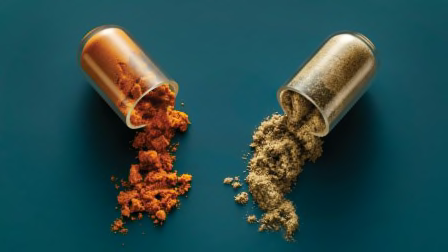Is Turmeric Good Medicine?
The truth about these supplements and inflammation

For hundreds of years, turmeric has been used not just as an earthy flavor enhancer but also as a remedy. People have turned to the spice—and to supplements made from one of its active components, curcumin—to treat a wide variety of ills, especially pain from the inflammation that comes with osteoarthritis and rheumatoid arthritis.
In a 2019 nationally representative Consumer Reports survey of 2,006 U.S. adults, 46 percent of people who took turmeric supplements said they did so to treat chronic health problems. But the evidence on whether they can help is still being debated, according to the National Institutes of Health. Here’s what the experts and the research have to say.
The Science of Turmeric
Researchers have long been interested in curcumin because it appears to be active when tested in preliminary studies in the lab. But there’s not yet clear evidence that curcumin is beneficial for people, perhaps in part because clinical studies are expensive.
One study, published in 2019, compared curcumin to diclofenac, a nonsteroidal anti-inflammatory drug (NSAID) used to treat arthritis pain. It found that curcumin worked just about as well as diclofenac for knee osteoarthritis. But there were two important caveats.
Many people swear by Vicks VapoRub for pain and other illnesses. Is the love justified?
What to Try Instead
For arthritis-related inflammation, a doctor might recommend an appropriate exercise program. Some research has found that even short bouts of exercise can help reduce inflammation—and regular exercise is even better.
Over-the-counter pain relievers and dietary changes may also ease symptoms of joint pain. “Fruits and vegetables have natural anti-inflammatory compounds and should be a part of every healthy diet,” Angelone says.
It’s not impossible that some sort of supplement might help with arthritis pain, Huffstutter says, but anything that seems too good to be true probably is. Discuss any supplements you are taking or considering with your doctor. In the meantime, don’t hesitate to cook with a little turmeric.
Know What You Are Buying
If you’re shopping for a supplement, you should know that the Food and Drug Administration does not verify that supplements contain what their labels say they do. Previous testing by Consumer Reports found that supplements—including turmeric and curcumin products—are sometimes contaminated with lead or bacteria.
That’s why careful shopping is key. Look for products that have been tested by a third party: Confirm a seal on the label from ConsumerLab.com, NSF International, UL, or U.S. Pharmacopeia (USP). CVS says all supplements it sells are tested by a third party.
Such seals don’t necessarily mean a product is safe, or that it does what it’s claimed to, but they should offer some assurance that you’re getting what’s on the label.
Editor’s Note: A version of this article also appeared in the October 2021 issue of Consumer Reports on Health.


